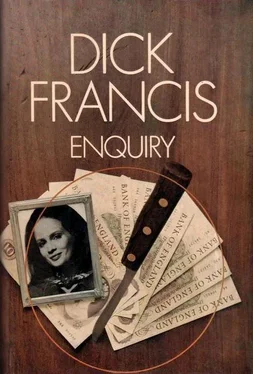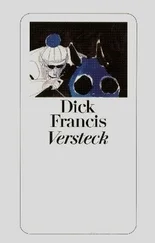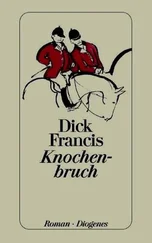Yesterday I lost my licence.
To a professional steeplechase jockey, losing his licence and being warned off Newmarket Heath is like being chucked off the medical register, only more so.
Barred from race riding, barred from racecourses. Barred moreover, from racing stables. Which poses me quite a problem, as I live in one.
No livelihood and maybe no home.
Last night was a right so-and-so, and I prefer to forget those grisly sleepless hours. Shock and bewilderment, the feeling that it couldn’t have happened, it was all a mistake... this lasted until after midnight. And at least the disbelieving stage had had some built-in comfort. The full thudding realisation which followed had none at all. My life was lying around like the untidy bits of a smashed teacup, and I was altogether out of glue and rivets.
This morning I got up and percolated some coffee and looked out of the window at the lads bustling around in the yard and mounting and cloppeting away up the road to the downs, and I got my first real taste of being an outcast.
Fred didn’t bellow up at my window as he usually did, ‘Going to stay there all day, then?’
This time, I was.
None of the lads looked up... they more or less kept their eyes studiously right down. They were quiet, too. Dead quiet. I watched Bouncing Bernie heave his ten stone seven on to the gelding I’d been riding lately, and there was something apologetic about the way he lowered his fat bum into the saddle.
And he, too, kept his eyes down.
Tomorrow, I guessed, they’d be themselves again. Tomorrow they’d be curious and ask questions. I understood that they weren’t despising me. They were sympathetic. Probably too sympathetic for their own comfort. And embarrassed: that too. And instinctively delicate about looking too soon at the face of total disaster.
When they’d gone I drank my coffee slowly and wondered what to do next. A nasty, very nasty, feeling of emptiness and loss.
The papers had been stuck as usual through my letterbox. I wondered what the boy had thought, knowing what he was delivering. I shrugged. Might as well read what they’d said, the Goddamned pressmen, God bless them.
The Sporting Life , short on news, had given us the headlines and the full treatment.
‘Cranfield and Hughes Disqualified.’
There was a picture of Cranfield at the top of the page, and half way down one of me, all smiles, taken the day I won the Hennessy Gold Cup. Some little sub-editor letting his irony loose, I thought sourly, and printing the most cheerful picture he could dig out of the files.
The close-printed inches north and south of my happy face were unrelieved gloom.
‘The Stewards said they were not satisfied with my explanation,’ Cranfield said. ‘They have withdrawn my licence. I have no further comment to make.’
Hughes, it was reported, had said almost exactly the same. Hughes, if I remembered correctly, had in fact said nothing whatsoever. Hughes had been too stunned to put one word collectedly after another, and if he had said anything at all it would have been unprintable.
I didn’t read all of it. I’d read it all before, about other people. For ‘Cranfield and Hughes’ one could substitute any other trainer and jockey who had been warned off. The newspaper reports on these occasions were always the same; totally uninformed. As a racing enquiry was a private trial the ruling authorities were not obliged to open the proceedings to the public or the press, and as they were not obliged to, they never did. In fact like many another inward-looking concern they seemed to be permanently engaged in trying to stop too many people from finding out what was really going on.
The Daily Witness was equally fog-bound, except that Daddy Leeman had suffered his usual rush of purple prose to the head. According to him: ‘Kelly Hughes, until now a leading contender for this season’s jump-jockeys’ crown, and fifth on the list last year, was sentenced to an indefinite suspension of his licence. Hughes, thirty, left the hearing ten minutes after Cranfield. Looking pale and grim, he confirmed that he had lost his licence, and added “I have no further comment”.’
They had remarkable ears, those pressmen.
I put down the paper with a sigh and went into the bedroom to exchange my dressing-gown for trousers and a jersey, and after that I made my bed, and after that I sat on it, staring into space. I had nothing else to do. I had nothing to do for as far ahead as the eye could see. Unfortunately I also had nothing to think about except the Enquiry.
Put baldly, I had lost my licence for losing a race. More precisely, I had ridden a red-hot favourite into second place in the Lemonfizz Crystal Cup at Oxford in the last week of January, and the winner had been an unconsidered outsider. This would have been merely unfortunate, had it not been that both horses were trained by Dexter Cranfield.
The finishing order at the winning post had been greeted with roars of disgust from the stands, and I had been booed all the way to the unsaddling enclosure. Dexter Cranfield had looked worried more than delighted to have taken first and second places in one of the season’s big sponsored steeplechases, and the Stewards of the meeting had called us both in to explain. They were not, they announced, satisfied with the explanations. They would refer the matter to the Disciplinary Committee of the Jockey Club.
The Disciplinary Committee, two weeks later, were equally sceptical that the freak result had been an accident. Deliberate fraud on the betting public, they said. Disgraceful, dishonest, disgusting, they said. Racing must keep its good name clean. Not the first time that either of you have been suspected. Severe penalties must be inflicted, as a deterrent to others.
Off, they said. Warned off. And good riddance.
It wouldn’t have happened in America, I thought in depression. There, all runners from one stable, or one owner, for that matter, were covered by a bet on any of them. So if the stable’s outsider won instead of its favourite, the backers still collected their money. High time the same system crossed the Atlantic. Correction, more than high time; long, long overdue.
The truth of the matter was that Squelch, my red-hot favourite, had been dying under me all the way up the straight, and it was in the miracle class that I’d finished as close as second, and not fifth or sixth. If he hadn’t carried so many people’s shirts, in fact, I wouldn’t have exhausted him as I had. That it had been Cranfield’s other runner Cherry Pie who had passed me ten yards from the finish was just the worst sort of luck.
Armed by innocence, and with reason to believe that even if the Oxford Stewards had been swayed by the crowd’s hostile reception, the Disciplinary Committee were going to consider the matter in an atmosphere of cool common sense, I had gone to the Enquiry without a twinge of apprehension.
The atmosphere was cool, all right. Glacial. Their own common sense was taken for granted by the Stewards. They didn’t appear to think that either Cranfield or I had any.
The first faint indication that the sky was about to fall came when they read out a list of nine previous races in which I had ridden a beaten favourite for Cranfield. In six of them, another of Cranfield’s runners had won. Cranfield had also had other runners in the other three.
‘That means,’ said Lord Gowery, ‘That this case before us is by no means the first. It has happened again and again. These results seem to have been unnoticed in the past, but this time you have clearly overstepped the mark.’
Читать дальше












